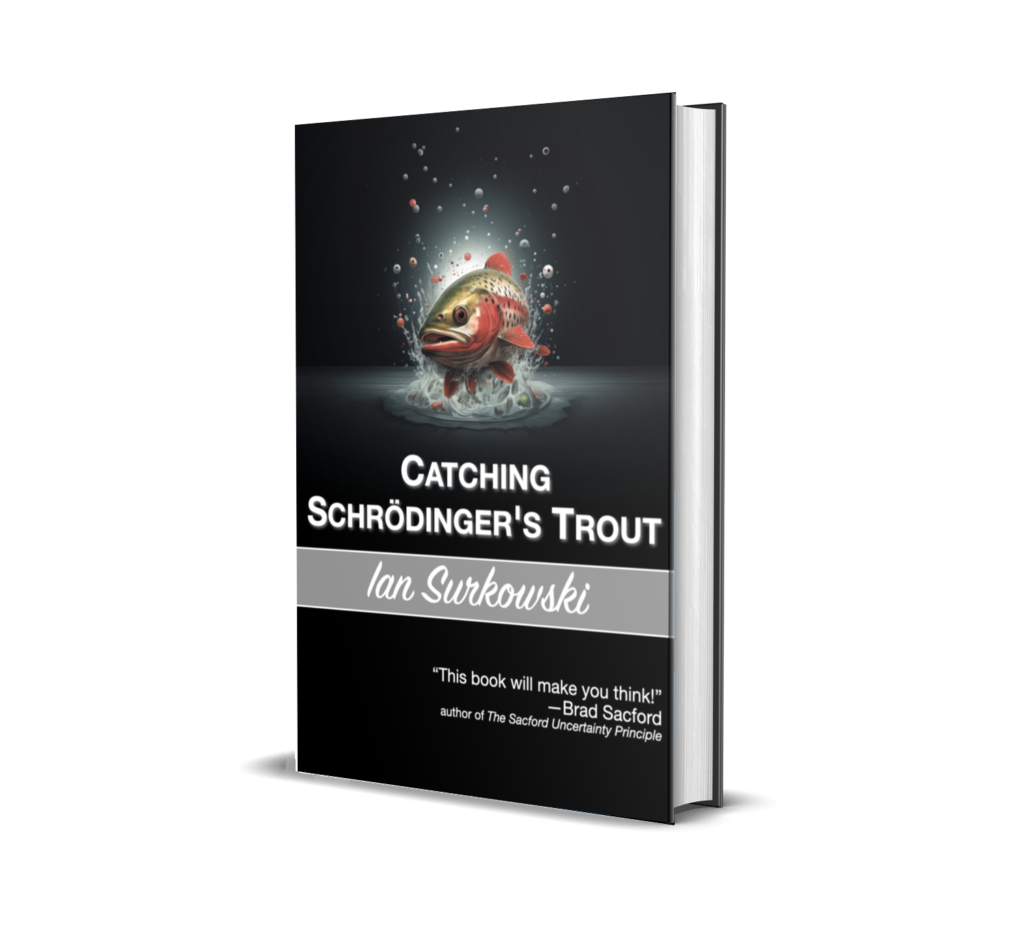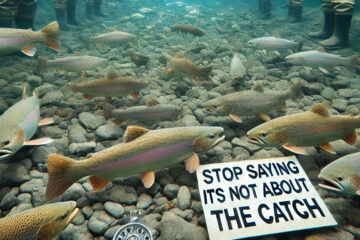Catching Schrödinger’s Trout by Ian Surkowski. MIT Press.
Ian Surkowski, the Pamala Leonard Professor of Physics and Philosophy at the California Institute of Technology, has written a book that will likely change how everyone—scientist and layperson alike—thinks about fishing for trout. Although Dr. Surkowski received the prestigious Fields Medal for his mathematical work on quantum theory as it applies to air travel, he is equally at home with a helium-neon laser or a five-weight Thomas and Thomas rod in his right hand, and his writing in Catching Schrödinger’s Trout is at a conversational level everyone will understand.

Typical of the accessible manner Surkowski uses throughout, he opens by explaining his transformational epiphany: “Standing beside the Henry’s Fork River in late June, it occurred to me that conventional thinking says a trout is either caught or it isn’t. But the lesson we learned from Erwin Schrödinger’s famous cat is that at the most fundamental level, something as elusive as a trout is both caught and not caught at all times before we either catch it or we don’t. We do not—I must stress, cannot—distinguish between a trout that is caught and one that isn’t until we’ve either caught it or we haven’t.”
For those without formal training in the Copenhagen interpretation of quantum systems, Surkowski lays bare the core idea behind his thesis: “In the same way a quantum system maintains the superposition of two states until it is observed by or interacts with an external entity, each trout in a river is both caught and not caught at the same time, much the way a lottery ticket is both a winner and a loser until we scratch the ultraviolet ink from its surface. Only after we reveal the numbers can we know if it is a winner or loser. Until then, it is an inseparable amalgamation of both.”
In Chapter Two, “If I Had More Time I’d Cast a Shorter Line,” Surkowski explains the importance of a minimalist approach to casting and wading. “We learn nothing from Schrödinger’s example if we are careless. Any external disturbance alerting the cat of our presence would render the experiment worthless. So, too, it is with trout. To successfully transform a trout from being both caught and not caught to the more favorable state of being caught, we must take great care to avoid alerting the trout of our presence. In nearly all circumstances, short casts are better than long casts.”
In Chapter Five, “Trout Do Not Play Dice,” Surkowski playfully acknowledges Albert Einstein’s concerns about quantum theory. “The theory produces a good deal but hardly brings us closer to the secret of the Old One. I am at all events convinced that He does not play dice,” the famous Nobel laureate wrote in response to Max Born’s praise of quantum theory. Surkowski then turns the tables and urges anglers to cast only to the most likely lies for a trout, preferably those where you’ve seen the fish eat from the surface. “An angler who casts randomly is essentially rolling dice or pulling the arm on a slot machine. Such games strongly favor the house (Surkowski’s euphemism for trout), and I recommend against playing them.”
Each chapter unveils fascinating insights into trout behavior with surprising lessons that promise to enhance anglers’ skills at all levels. More than just improving catch rates, though, Surkowski’s approach invites readers to engage more profoundly with the entire world, fostering a richer interaction with the surrounding environment. In Chapter Eight, “Wading Into Deep Waters,” Surkowski explains how this quantum superposition theory applies to personal finance, gardening, romance, the meaning of life, and, yes, even Instant Pot cooking. “When you think about it carefully, an Instant Pot is much like Schrödinger’s box,” he suggests. “Until you release the pressure and open the pot, the roast inside is both cooked and uncooked. Opening the pot is the only way to reveal the roast’s state.”
Surkowski informs, entertains, and educates us throughout this book with his sly wit and self-deprecating humor. But make no mistake, you’re peeking into the mind of a brilliant polymath. “People sometimes ask why trout are in this mingled state of being both caught and not caught until we force the situation. That’s like asking why a magnet’s positive side attracts another’s negative side. Questions of why are beyond science. We can only use reliable models to predict how the world works—magnets and trout included.” Well said, professor. Well said, indeed.


